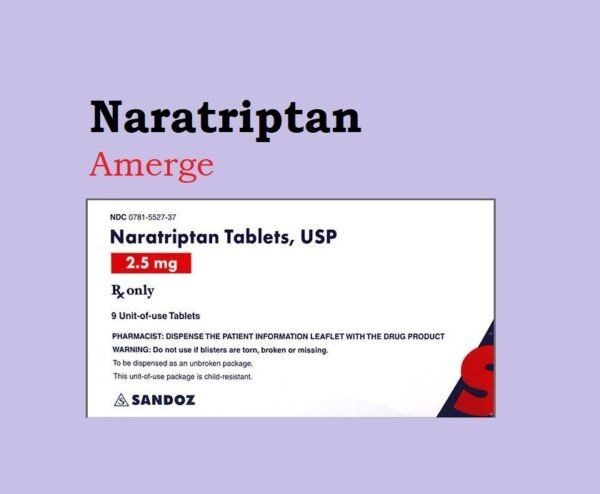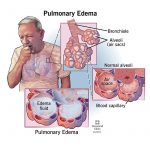
naratriptan – oral, Amerge
Medication Uses: This medication is used to treat migraines. It relieves headaches, pain, and other migraine symptoms, including sensitivity to light/sound, nausea, and vomiting. Prompt treatment allows you to resume your normal routine and may reduce your need for other pain medications. Naratriptan does not prevent future migraines or reduce their frequency. It belongs to a group of drugs called triptans. It affects serotonin, a natural chemical that constricts blood vessels in the brain, and may also block other pain pathways in the brain.
HOW TO USE: Read the Patient Information Leaflet provided by your pharmacist before starting naratriptan and each time you get a refill. Ask your doctor or pharmacist if you have any questions. Take one tablet orally at the first sign of a migraine or as directed by your doctor. Do not use naratriptan to prevent a migraine. If your symptoms do not improve, do not take more doses of this medication before consulting your doctor. If your symptoms are only partially relieved or your headache returns, you may take a second dose after 4 hours or as directed by your doctor. Do not exceed 5 milligrams in 24 hours. If you are taking naratriptan for the first time and have risk factors for heart disease, your doctor may have you take your first dose in their office to monitor for rare but serious heart problems. Your dosage is based on your medical condition and response to therapy. Inform your doctor if your condition does not improve or worsens. Overuse of drugs to treat sudden migraine attacks can worsen headaches (medication overuse headache) or cause rebound headaches. Therefore, do not use this medication more frequently or for longer than prescribed. Inform your doctor if you need to use this medication more often, if it is not effective, or if you experience more frequent or severe headaches. Your doctor may need to adjust your medication or prescribe an additional one to prevent headaches.
SIDE EFFECTS: Common side effects may include flushing, tingling/numbness/prickling/heat sensations, weakness, drowsiness, or dizziness. If any of these effects persist or worsen, notify your doctor or pharmacist promptly. Chest/jaw/neck tightness may occur shortly after using naratriptan, but are rarely signs of a serious condition. It can be difficult to distinguish between this and a serious reaction related to inadequate blood flow to the heart, brain, or other parts of the body. Seek medical attention immediately if you experience very serious side effects, such as chest pain, jaw/left arm pain, fainting, fast/irregular/pounding heartbeat, vision changes, weakness on one side of the body, confusion, slurred speech, sudden or severe stomach/abdominal pain, bloody diarrhea, change in urine volume. This medication may increase serotonin levels and rarely cause serotonin syndrome/toxicity, which can be severe. The risk is higher if you are also taking other drugs that increase serotonin. Seek immediate medical help if you experience symptoms such as fast heartbeat, hallucinations, loss of coordination, severe dizziness, severe nausea/vomiting/diarrhea, twitching muscles, unexplained fever, or unusual agitation/restlessness. A serious allergic reaction to this drug is rare, but seek medical help if you observe symptoms such as rash, itching/swelling (especially of the face/tongue/throat), severe dizziness, or trouble breathing. This is not a complete list of possible side effects. Consult your doctor or pharmacist for more information. In the US, you can report side effects to the FDA at 1-800-FDA-1088. In Canada, contact Health Canada at 1-866-234-2345.
PRECAUTIONS: Before taking naratriptan, inform your doctor or pharmacist if you are allergic to it or other triptan migraine drugs or if you have any other allergies. This product may contain inactive ingredients that can cause allergic reactions or other problems. Consult your pharmacist for more details. Before using this medication, inform your doctor or pharmacist about your medical history, especially if you have heart disease, decreased blood flow in the brain, blood circulation disease, certain types of headaches, kidney disease, or liver disease. You should also inform your doctor if you have risk factors for heart disease, such as diabetes, a family history of heart disease, high blood pressure, high cholesterol, being overweight, being a smoker, being female after menopause, or being male over age 40. If you are at high risk for heart disease, your doctor might want to monitor your heart before prescribing naratriptan. This drug may cause dizziness or drowsiness. Avoid driving, operating machinery, or engaging in activities that require alertness until you are confident that you can do so safely. The risk of heart disease and high blood pressure increases with age, so older adults may be more sensitive to the side effects of this medication, especially increased blood pressure and heart problems. Use this medication during pregnancy only if clearly needed and after discussing the risks and benefits with your doctor. It is unknown if this drug passes into breast milk, so consult your doctor before breastfeeding.
DRUG INTERACTIONS: Drug interactions can change how your medications work or increase your risk of serious side effects. This document does not include all possible drug interactions. Keep a list of all the products you use (including prescription/nonprescription drugs and herbal products) and share it with your doctor and pharmacist. Do not start, stop, or change the dosage of any medicine without your doctor’s approval. If you take any ergotamine medication or other "triptan" drugs, you need to space out your doses of naratriptan and these medications to minimize the risk of serious side effects. Consult your doctor to determine the appropriate waiting period between doses. The risk of serotonin syndrome/toxicity increases if you take other drugs that increase serotonin. Examples include street drugs like MDMA/"ecstasy," St. John’s wort, and certain antidepressants. The risk may be higher when starting or increasing the dosage of these drugs.
OVERDOSE: If overdose is suspected, contact a poison control center or emergency room immediately. In the US, call your local poison control center at 1-800-222-1222. Canadian residents can call a provincial poison control center.
QUESTION
NOTES: Take this medication only as needed when a migraine occurs, as directed by your doctor. Do not take this medication on a regular schedule. Do not increase your dose or take it more often than prescribed by your doctor. Certain foods/beverages or food additives, as well as certain lifestyle patterns, may trigger migraines. Avoiding these triggers may help reduce the frequency of migraines. Consult your doctor for more information. Periodic laboratory and/or medical tests, such as blood pressure measurements, may be conducted to monitor your progress or check for side effects. Consult your doctor for more details. This medication does not require a missed dose. Store at room temperature, away from light and moisture. Do not store in the bathroom. Keep all medications out of reach of children and pets. Do not flush medications down the toilet or pour them into a drain unless instructed to do so. Properly dispose of this product when it is expired or no longer needed. Consult your pharmacist or local waste disposal company. Last revised October 2013. Copyright(c) 2013 First Databank, Inc.


